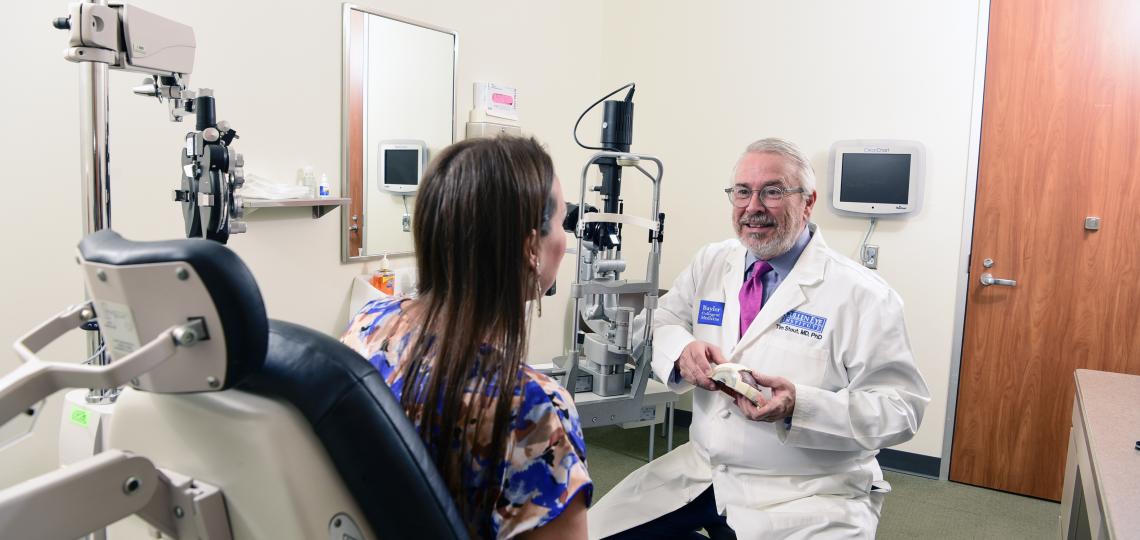Andalusia Pediatrics: Exceptional Care for Children's Health Demands
Andalusia Pediatrics: Exceptional Care for Children's Health Demands
Blog Article
Is Refractive Surgical Treatment Right for You? Aspects to Consider for Better Eyecare
In the world of eye treatment, the decision to undergo refractive surgical procedure is a weighty one that demands thoughtful factor to consider. From the details of one's eye wellness to the ins and outs of personal expectations and daily practices, each facet holds value in the broader landscape of refractive surgery candidacy.
Eye Health Assessment
When considering refractive surgery, a comprehensive eye health and wellness assessment is vital to assess the viability of the procedure for each person. cardiologist andalusia. This assessment involves a series of assessments and tests carried out by an eye care professional to figure out the total health of the eyes, the presence of any kind of underlying conditions, and the stability of the refractive error
During the evaluation, different aspects are thought about, such as the client's medical history, current eye prescription, corneal density, student size, and tear movie quality. These assessments assist to recognize any contraindications to refractive surgical procedure, such as corneal irregularities, cataracts, or without treatment eye infections. In addition, the examination helps to handle individual expectations pertaining to the possible results of the surgical procedure based upon their unique eye attributes.
Ultimately, the eye wellness assessment is essential in ensuring the safety and performance of refractive surgical procedure, as it offers valuable understandings right into the individual's eye wellness status and aids identify one of the most appropriate therapy options for accomplishing optimum visual end results. (andalusia pediatrics)
Lifestyle Assessment
A comprehensive lifestyle analysis is essential in figuring out the viability of refractive surgery for a person's visual improvement requirements. Lifestyle elements such as line of work, pastimes, and daily activities play a vital duty in the decision-making process relating to refractive surgical procedure. For example, individuals with professions that include a high level of exercise or exposure to ecological elements may have various aesthetic requirements compared to those with less active desk jobs. Recognizing just how an individual's lifestyle might affect their vision post-surgery is vital for managing expectations and making certain ideal end results.
Moreover, way of living routines such as sports participation, outside tasks, or perhaps skin care regimens can affect the recovery process and overall success of refractive surgery. People who involve in get in touch with sporting activities may need to take additional precautions to secure their eyes throughout the recovery duration. Furthermore, individuals with extensive sunlight direct exposure might require extra post-operative like avoid difficulties. By carrying out a comprehensive way of living assessment, eye treatment professionals can customize their recommendations and therapy strategies to meet the distinct demands of each patient, ultimately resulting in improved aesthetic outcomes and satisfaction.
Assumption Placement

Individuals need to understand that while several individuals achieve 20/20 vision or much better complying with refractive surgical treatment, some might still require glasses for certain activities like analysis or driving at night. Handling these assumptions assists protect against dissatisfaction and discontentment post-surgery, leading to an extra positive overall experience for the client.
Threat Evaluation

Factors that might increase the danger of issues consist of age, specific clinical conditions like autoimmune illness, unstable vision prescription, thin Our site corneas, and impractical individual expectations. In addition, picking a skilled and seasoned cosmetic surgeon, adhering to pre and post-operative treatment guidelines vigilantly, and revealing any kind of appropriate medical background can help minimize threats.
To decrease the chance of difficulties, eye doctors perform detailed pre-operative examinations to determine any type of contraindications to surgery. They additionally talk about the possible risks and benefits with patients during the examination procedure. By taking you can try this out part in open interaction and shared decision-making, both the eye doctor and the client can interact to figure out if refractive surgical treatment is the right selection based upon private danger profiles and preferred end results.
Appointment Significance
Considering the important duty of notified decision-making in analyzing risks and potential complications in refractive surgery, the assessment process holds considerable value in directing individuals towards optimal outcomes. During the appointment, the ophthalmologist examines the client's eye health and wellness, refractive mistakes, and overall suitability for surgery. This initial evaluation is crucial in establishing the most appropriate procedure for each and every individual, thinking about factors such as corneal thickness, student dimension, and existing eye problems.
Additionally, the appointment works as a chance for people to review their assumptions, issues, and any kind of concerns they may have pertaining to the surgical procedure. Clear communication in between the doctor and the person is important to ensure practical expectations and a comprehensive understanding of the prospective risks and benefits included.
Additionally, the consultation permits the surgeon to discuss the various surgical options available, their respective outcomes, and the post-operative treatment required. This thorough conversation encourages individuals to make educated decisions about their eye treatment, causing far better fulfillment and results post-surgery.
Verdict
In verdict, people considering refractive surgery should undergo a comprehensive eye health assessment, evaluate their way of life habits, straighten their expectations with potential outcomes, assess the involved dangers, and prioritize examinations with eye treatment specialists. These aspects play an important duty in figuring out the suitability of refractive surgical procedure for each individual, guaranteeing ideal outcomes and satisfaction with the procedure.
Clients thinking about refractive surgical treatment usually have high expectations relating to the end results, anticipating perfect vision without the need for glasses or get in touch with lenses. While refractive surgery can significantly enhance vision and decrease dependence on visual help, it is crucial for patients to understand that results might vary based on private elements such as the level of refractive error, corneal density, and overall eye health.
By involving in open interaction and shared decision-making, both the person and the ophthalmologist can function together to establish if refractive surgery is the right choice based on individual danger accounts and desired outcomes.
Thinking about the essential duty of notified decision-making in assessing risks and possible issues in refractive surgery, the assessment procedure holds considerable relevance in guiding people towards optimum outcomes. Throughout the assessment, the eye doctor assesses the person's eye health, refractive mistakes, and general suitability for surgical treatment.
Report this page